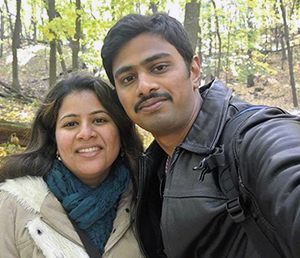Washington, Feb 25: In an ideal world, an America of their dreams, they might have forged a start-up company called Kuchibhotla & Madasani. But a hateful moment in the American hinterland, spotty with prejudice, extinguished their dreams.
Srinivas Kuchibhotla and Alok Reddy Madasani conformed to the archetype Indian nerds taking a familiar route to the US. Finish undergrad engineering in India, go to US for Master's, and latch on to a job here through the OPT (Optional Practical Training) and H1-B visa route. Over the past decade, a majority of such IT professionals are from Andhra/Telengana region because of the proliferation of engineering colleges there.
Kuchibhotla, who went by the nickname Srinu, studied electrical engineering at the Vidya Jyothi Institute of Technology in Hyderabad before coming to US to earn a master's degree in electrical and electronic engineering from the University of Texas at El Paso, where he also worked as a teaching and research assistant before graduating in 2007. He began as a software engineer at Rockwell Collins and worked there until 2014, when he moved to Kansas to start a job at Garmin International.
Madasani, who was an aviation program coordinator manager at Garmin, had a similar background. He studied at the Vasavi College of Engineering, also in Hyderabad, before coming to the University of Missouri-Kansas City for his Master's. A cricket buff, he has a 2013 photo of Sachin Tendulkar as his cover photo on Facebook.
The two were regulars at the Austin Bar and Grill, where waiters told the local media they came couple of times a week to drink Jameson's and smoke over a basketball game.
Also a regular patron is Ian Grillot, the American who tackled the gunman at the first opportunity, believing he had emptied the magazine, but found his shoulder intercepting the last bullet.
''It wasn't right, and I didn't want the gentleman (the gunman) to potentially go after somebody else,'' Grillot said in a video released by the University of Kansas Health System, amid all-round praise for standing up for American values. He was ''just doing what anyone should have done.''
''It's not about where he's from, or ethnicity. We're all humans,'' he told the local media of the life he had saved, calling the survivor Madasani his ''best friend'' now.
Olathe residents, and Americans and Indians across the country, spoke from their hearts -- and their wallets as the incident ignited passionate discussions on social media. A funding campaign to help Kuchibhotla's family by aiming to raise $ 150,000 raced towards $ 300,000 within 24 hours of going up.
Among those who wrote on the site was Grillot's sister Maggie, who said, ''My brother was the third victim. My deepest condolences to the family- I'm so very sorry for your loss. My brother wishes he could have done more for your family. Keeping everyone in my prayers.''
Another message read: ''As a former engineer myself who has worked with many very friendly and hard working Indian engineers over the years I can't help but feel so badly for this man and his family... I'm horrified at this shooter's racism since I have never met an Indian native that I didn't like. Praying for Srini and his family.''
Indian consular officials are helping the victims' family and other Indian professionals come to grips with the situation.
But for Srinu's wife Sunayana, it is a tragedy beyond grief. ''Thanks for all those who made it to farewell parties!!!!! It was very difficult and emotional moment to leave you all, to start our new journey at Kansas,'' she had posted on social media in 2014 as they left Dallas.
One of her last posts from Kansas read, ''Totally enjoyed Hasee toh phasee -- a good movie after a long time.''





Comments
Add new comment